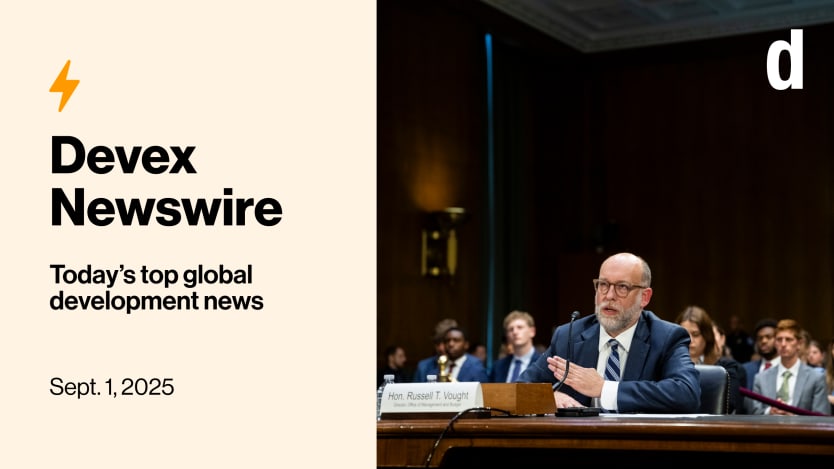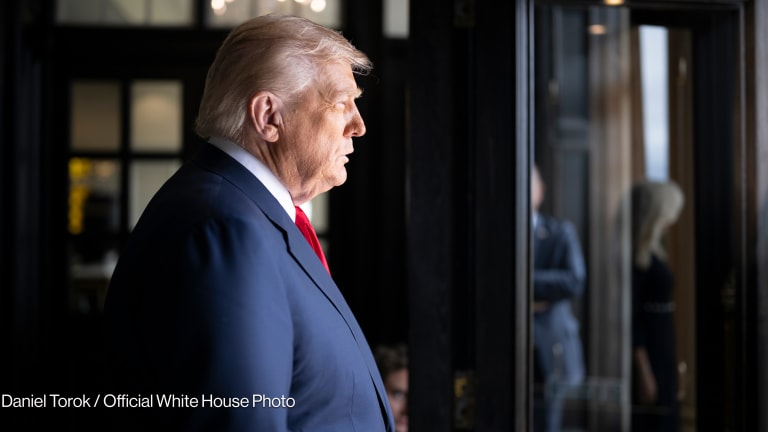Presented by Boehringer Ingelheim

President Donald Trump’s administration is pulling out every trick in the book in its effort to not spend U.S. foreign aid funds — even when Congress already approved them. On Friday, the White House proposed another budget rescission. But this $5 billion clawback comes with a twist.
Also in today’s edition: Akinwumi Adesina steps down after 10 years at the helm of the African Development Bank, and Malawi fights to keep HIV prevention services on track in the wake of harsh aid cuts.
+ Upcoming event: On Sept. 3, we’re hosting a Devex Career Briefing on development consulting. Join the live “ask me anything” session and have experts answer your questions about rates, roles, networking, and how to succeed in today’s saturated consulting market. Save your spot now.
Measure twice, cut one zillion times
If you thought the Trump administration was done finding ways to cut foreign aid funding, I have some bad news. On Friday, the White House sent another rescission proposal to Congress, requesting lawmakers’ approval to cancel $5 billion in foreign assistance funding that was already approved in previous fiscal years.
Recall, the White House already carried out a successful rescission in July, sending about $8 billion in foreign aid funds back to the U.S. Treasury. This time, Trump’s budget director and fervent aid opponent, Russell Vought, is trying something new — or rather, old.
This rescission proposal landed in Congress’ inbox with just one month remaining before the end of the fiscal year, and it includes billions of dollars in funding that will expire if the government doesn’t spend it before then. That means lawmakers have very little time to consider the rescission, and the State Department — which now controls foreign aid — won’t have time to spend it anyway.
That maneuver is known as a “pocket rescission.” It hasn’t been done since 1977, and the Government Accountability Office has since ruled that it is illegal. But Vought has been itching for this fight for years.
If he gets one, it could have less to do with whether lawmakers want the White House to spend foreign aid money — a fight the development community has not been winning — and more to do with the constitutional separation of powers. The question is: Will Congress push back on the Trump administration’s ongoing effort to ignore previous funding agreements and steamroll the legislative branch’s power of the purse?
Some of the early responses to Friday’s proposal suggested that a fight might be on the horizon.
“Any effort to rescind appropriated funds without congressional approval is a clear violation of the law,” said Sen. Susan Collins, a Republican from Maine and chair of the Senate Appropriations Committee.
Whether Congress steps in or not, the U.S. aid community is still facing a harsh reality: Billions of foreign aid dollars are slated to expire on Sept. 30, and the Trump administration has not appeared in a hurry to spend the money before that happens.
In a move that left little doubt about who is the driving force behind the administration’s anti-aid agenda, Secretary of State Marco Rubio announced Friday that Vought will oversee USAID’s “closeout.”
Read: Trump's $5B ‘pocket rescission’ escalates foreign aid funding fight
+ For Devex Pro members, I’ve recently launched a limited-time special Saturday edition of our Pro Insider newsletter, where I examine some of the biggest questions about the evolving realities of U.S. aid. Not yet a Pro member? Start your 15-day free trial today to access all our expert analyses, insider insights, funding data, events, and more.
Optimist prime
After a decade at the helm of the African Development Bank, Akinwumi Adesina is stepping down — leaving behind a bigger, more visible, and more innovative institution.
The Nigerian economist, often referred to as Africa’s “optimist in chief,” tripled the bank’s capital from $93 billion to $318 billion and set out a clear vision through his signature “High 5s” agenda: Power Africa, Feed Africa, Industrialize Africa, Integrate Africa, and Improve Quality of Life.
Under his watch, AfDB pioneered new approaches to development finance, including the first hybrid capital issuance by a multilateral development bank. “Most would acknowledge that AfDB has become very innovative when it comes to financial innovations,” says Annalisa Prizzon of ODI Global, who also credits Adesina with leaving behind a transparent portfolio and a coherent 10-year strategy.
The bank also launched flagship initiatives such as the Africa Investment Forum and Mission 300, a joint effort with the World Bank to connect 300 million Africans to electricity by 2030.
Still, delivery didn’t always match ambition. The Desert to Power solar program has reached less than 3% of its target, while critics noted “delivery and structural gaps,” including delayed projects and limited authority for country offices, says Brenda Chongo Chanda of African Center for Economic Transformation.
Adesina acknowledged the toll of the role but described it as a calling: “For the last 10 years, I’ve had no life. But I always say that I couldn’t think of anything more important than to be given the trust, the responsibility, and the resources to go and transform the continent of my birth,” he told my colleague Ayenat Mersie in January. “This is not a job for me. This is a mission.”
His successor, Mauritanian economist Sidi Ould Tah, takes office this week in Abidjan.
Read: The bowtie bows out — Adesina’s 10 years at AfDB
+ It’s news quiz time! Scroll to the bottom to see if you can ace our quiz.
Backsliding
Malawi has been a proving ground for HIV prevention efforts in sub-Saharan Africa. The country spearheaded the introduction of a new long-acting injectable method last year, and has seen new HIV infections fall from an estimated 19,000 in 2020 to an estimated 11,800 in 2024.
Then came the Trump budget cuts.
While Malawi’s success in preventing new HIV infections has been laudable, it was also significantly dependent on international aid, with about 85% of the country’s HIV response funded by donors.
With USAID, one of the largest funding sources, first frozen, then significantly reduced, a country that was on the path to prevention gains is now struggling to sustain that momentum, Devex contributor Andrew Green reports. And it’s all happening just as innovations in long-acting injectable pre-exposure prophylaxis, or PrEP, bring big opportunities — and big price tags.
Drop-in centers that served marginalized communities have also been shuttered in the wake of U.S. funding cuts.
“Because they face potential harassment at government facilities, members of these communities said that if the DICs were closed or their services sharply reduced, they would rather just go without prevention. The repercussions are starting to become clear,” Andrew reports.
Read: In Malawi, the fight to get HIV services back on track post-USAID cuts
+ For more content like this, sign up to Devex CheckUp — our free weekly newsletter that provides front-line and behind-the-scenes reporting on global health.
Meeting the moment
With official development assistance in retreat, this is the moment for philanthropies to step up and fill the gaps of a global funding crisis. But are they? Not really, according to experts in a recent Devex Pro Briefing that tackled the question of how giving could evolve.
“I think the discourse has evolved a lot in the field. … Unrestricted giving, multiyear, long-term vision, trust-based, and so on,” said Benjamin Bellegy, executive director of WINGS. “But the translation of those words and concepts into practice has been really slow.”
Read: How can philanthropy fund development better? (Pro)
Related reading: As aid dwindles, can philanthropy rewrite the rules of giving? (Pro)
In other news
At least 11 United Nations staffers were detained by Houthi rebels following a raid on U.N. offices in Sanaa, Yemen, on Sunday. [Reuters]
Palestinian President Mahmoud Abbas has urged the U.S. government to reverse its decision to rescind his visa and those of 80 other officials ahead of this month’s U.N. General Assembly in New York. [AP]
A magnitude 6.0 earthquake hit Afghanistan on Sunday, killing more than 600 people and injuring 1,500 others. [France 24]
Mind power
Take the rest of our five-item news quiz based on August’s most-read news articles.
Sign up to Newswire for an inside look at the biggest stories in global development.








